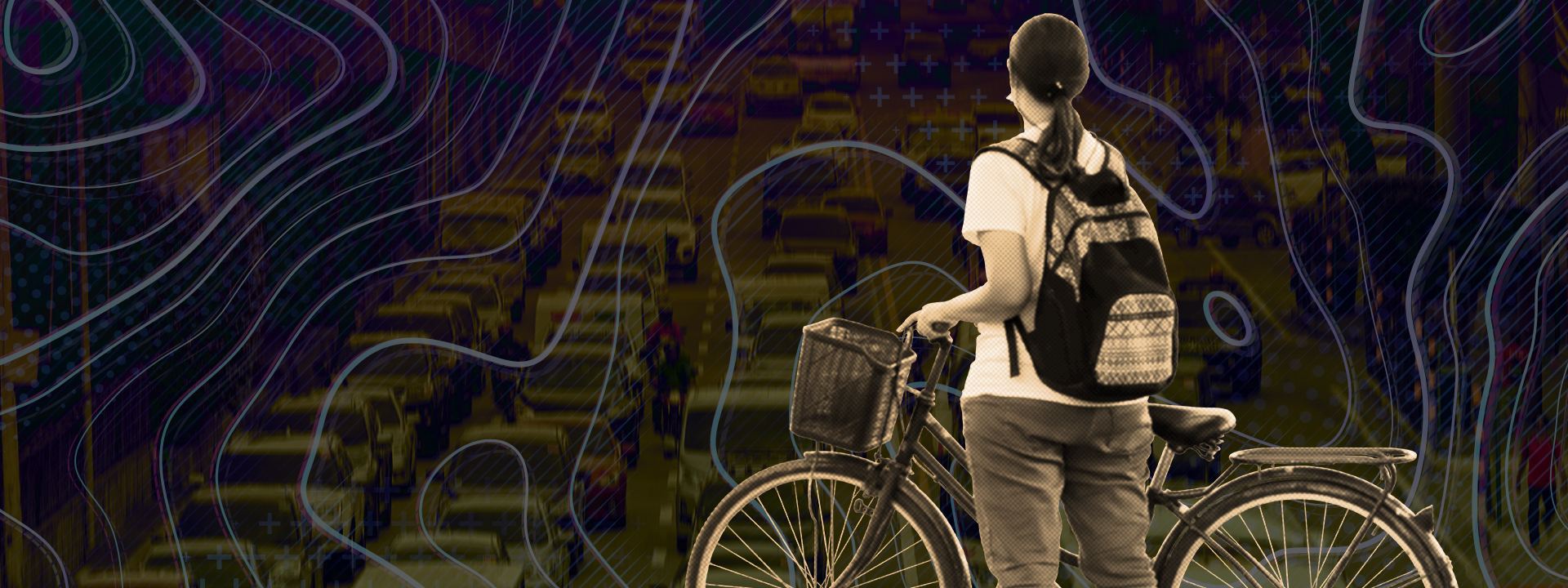One day, Jessica* was pedaling her bicycle home in one of the quieter streets of Makati City. Dusk was falling, and she was enjoying the solitary ride. Suddenly, a male bike delivery rider started biking beside her.
Jessica thought at first that the man was just being friendly. She grew uneasy, though, when he kept riding with her — and pestered her for her address and cellphone number. So, Jessica sped to a busier street and stopped at a convenience store on the pretense of needing to buy something. It was only then that the man rode away.
Leona* was minding her own business and biking, when a man riding a motorcycle squeezed her breast. On the other hand, Diana Teofilo has been body-shamed as a big woman who bikes. She heard rude comments like “Oh, the tire is flat because the rider is heavy.” When that happens, she tells Inquirer.net, “I just ignore them, I don’t fight back, but sadly, that’s how it is.”
Women in the Philippines have long been sexually harassed in public spaces. In 2016, the Social Weather Stations surveyed women in Quezon City, the most populous city in Metro Manila, on this topic. The survey found that 3 out of 5 women in the city had been sexually harassed in public spaces at one point in their lives. Total strangers have catcalled them, made lewd comments, groped them, and worse. Fifty-eight percent of the women said the incidents took place in the streets, often during broad daylight.
Many Filipinas like Jessica, Leona, and Gina have discovered the joys of cycling during the pandemic. They have been sexually harassed on and off the streets, though. They also risk life and limb every time they pedal their bicycles on unsafe roads.
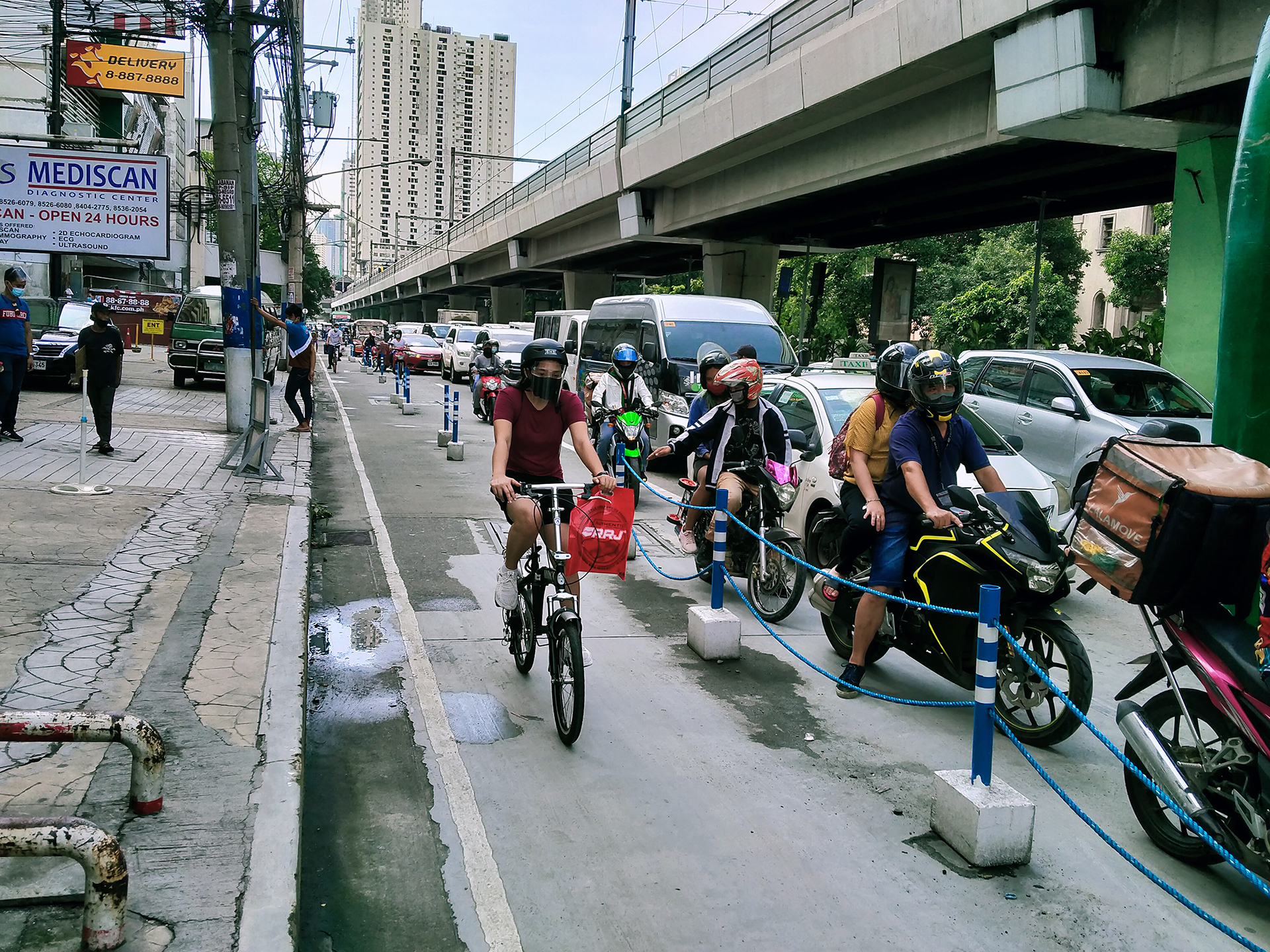
As public transportation ground to a halt during the lockdowns, many Filipinas started biking to get from A to B. (Photo: Dinna Louise C. Dayao)
Empty roads, no public transport
Women all over the world are behind the huge increase in cycling in 2020, says fitness app Strava. The company’s research in the past “found that one of the biggest blocks for women to cycling is a perceived safety risk,” says Simon Klima, Strava’s director of international marketing. “But during the pandemic women perhaps felt safer to take to their bicycles, thanks to some temporary infrastructure improvements and quieter roads.”
The empty roads in Metro Manila during the 2020 lockdowns emboldened many women to discover the joys of pedaling their bicycles. While data is hard to find, urban cyclist Keisha Mayuga observes that nowadays more women move around on two wheels in the megacity.
“Before, I would count up to 20 cyclists before I saw another woman,” says Mayuga, an urban planner and transport specialist. “Now that it’s getting more popular, I can count [that] one out of five people cycling are women.”
The March 2020 lockdown also dealt a big blow to public transport. Among all transport modes in Metro Manila, “public transport experienced the largest drop (−74.5 %, on average),” write Marc Hasselwander et al. in their study. The study shows that “those most reliant on public transport were disproportionately affected by lockdowns.”
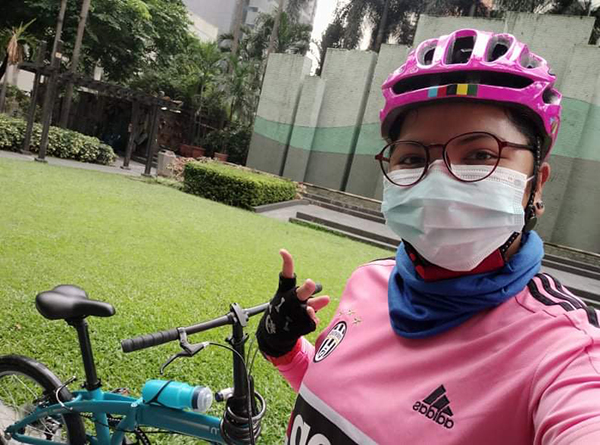
These include women like Lhen San Juan and Corinna Pettyjohn who do not own cars. The transport crisis drove them to bike to work and run their essential errands.
San Juan, a nurse, lives and works in Pasig City. She used to spend as much as ₱200 (about US$4) per day on taxi fare — only to get stuck for hours in gridlock.
During the pandemic, San Juan found it more convenient to ride her folding bike to and from work every day. “It saves me money and time, and it’s flexible,” she says. “I can get to work in 30 minutes, fold my bike, and bring it into the clinic if there is no bike parking.”
Pettyjohn, an English Second Language Specialist, lives in Makati City. She struggled to buy enough groceries for her young family of four until she and her husband bought a folding bike. Soon, she blogged, “I was hauling 10kg of rice, a couple of bags of produce, canned goods, drinks, diapers, and all the rest of a week’s supply run on this tiny thing.”
Unsafe streets
Cyclists in Metro Manila are forced to travel in slivers of unsafe space, alongside trucks, buses, and cars. The good news is that the government has budgeted ₱814 million (about US$16.8 million) to build 306 kilometers of protected bike lanes in Metro Manila.
The bad news, though, is that the construction of the lifesaving lanes is behind schedule. This prompted the Move As One Coalition, a civil society group, to point out in February that “Each day of delay exposes Filipino cyclists to the risk of injuries — even death — on the roads.” Last year, a male nurse and a female doctor died in road crashes in the city of Manila as they were riding their bicycles.
San Juan considers the lack of safe and protected cycling infrastructure and the hostility of bus drivers a form of harassment. She says, “Every time I see broken glass scattered on the painted bike lanes and bus drivers swerve near me, I feel harassed.” San Juan feels vulnerable when she’s on the night shift and bikes home beyond 11 p.m. Though she uses reflectors and lights, she is on the road at a time when the big trucks are out.
San Juan faces another danger: criminal elements. One night, she was approaching a poorly-lit bridge, which has reportedly been the scene of many thefts. She heard a man call her ate (Filipino for “older sister”); then she saw another man standing on the bridge. The thought of being harmed by the two men triggered her “fight-or-flight response,” she says. San Juan biked as fast as she could.
Online harassment
Women cyclists in the Philippines don’t just fear for their safety on the streets. They grapple with sexual harassment online, too.
Recently, a company selling cycling shirts used a photo showing a male cyclist craning his neck backward to get a better view of a woman in workout clothes. The company posted the image on its Facebook account with statements in Filipino, which translate to the following: “A fellow cyclist is caught in the act of admiring the roadside scenery. Always keep your eyes on the road to avoid crashes.” Smileys accompanied the statements. (The post has been taken down.)
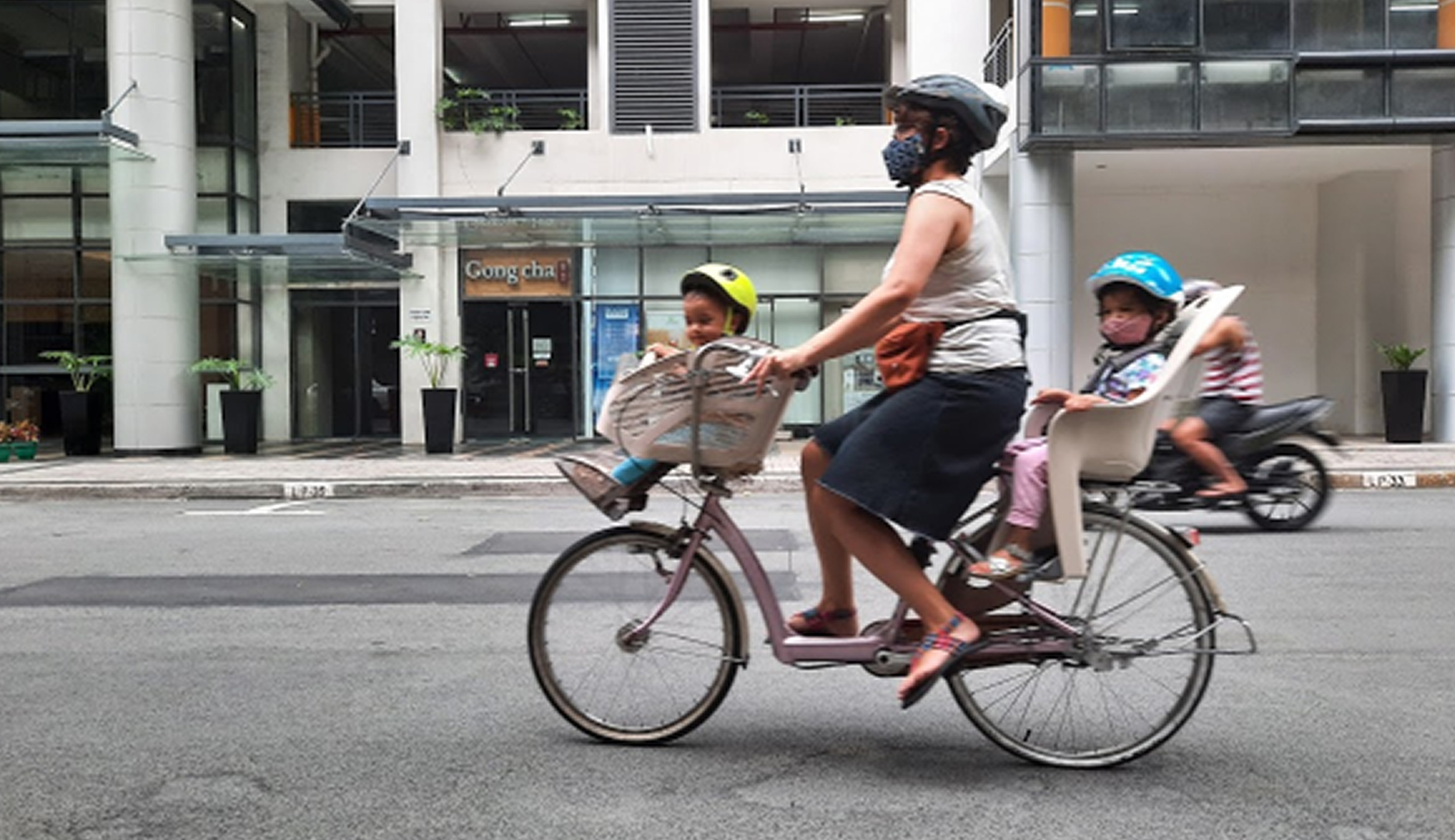
Corinna Pettyjohn feels safe enough to bike with her two kids. She dreams of a more bike-friendly Metro Manila, though. Pettyjohn says, “Maybe when my kids are older, they’ll be able to ride through these streets without giving their mama a heart attack!” (Photo: 2Wheels3Hearts via Facebook)
The post went viral. Netizens posted what the group Women Bikers for Safe Spaces describes as “disrespectful memes and commentaries on the woman’s body.” In an online petition, the group calls for the full implementation of the Safe Spaces Act enacted in 2019. The Act penalizes catcalling, misogynistic comments, and other forms of sexual harassment in public places, workplaces, schools, and online spaces. As of this article’s writing, the petition has 9,176 signatures.
In a statement, congressional representative Arlene Brosas says: “Women are not sceneries (sic) nor eye candies (sic) on the road. These lewd posts and comments circulating in male-dominated online hubs and cycling communities are clearly indications of the deep-seated sexism and objectification of women in our society that should never be tolerated.” The lawmaker represents Gabriela, a party list advocating women’s rights.
A steed to ride into a new world
Filipina cyclists face an uphill ride on and off the road. Yet, having discovered the freedom and mobility of two-wheeled travel, they want to keep riding their bikes even into the dawn of a new world after the pandemic. They will use their best judgment as they make calculations for their safety.
Nurse San Juan has “grown to love bike commuting.” However, until she feels safe enough to bike home alone at night, she has decided to ride the company shuttle service when her shift ends late or during curfew hours.
Pettyjohn says that she “absolutely” will keep biking even beyond the pandemic. In her blog, she writes, “I have seen a few too-close passes and a catcall or two, but I am fortunate that the experience has still been overwhelmingly positive. There’s still a long way to go before we can call Metro Manila bike-friendly, though, but there is strength in numbers, so I want to keep at it [for] as long as I can.” ●
* Names have been withheld to protect the women’s identities.
Dinna Louise C. Dayao is an independent journalist in Manila. She dreams of the day when she can safely pedal around the Philippines on a network of protected bicycle lanes.
…
A sisterhood in cyberspace
How Filipinas found ways to use social media to help other women
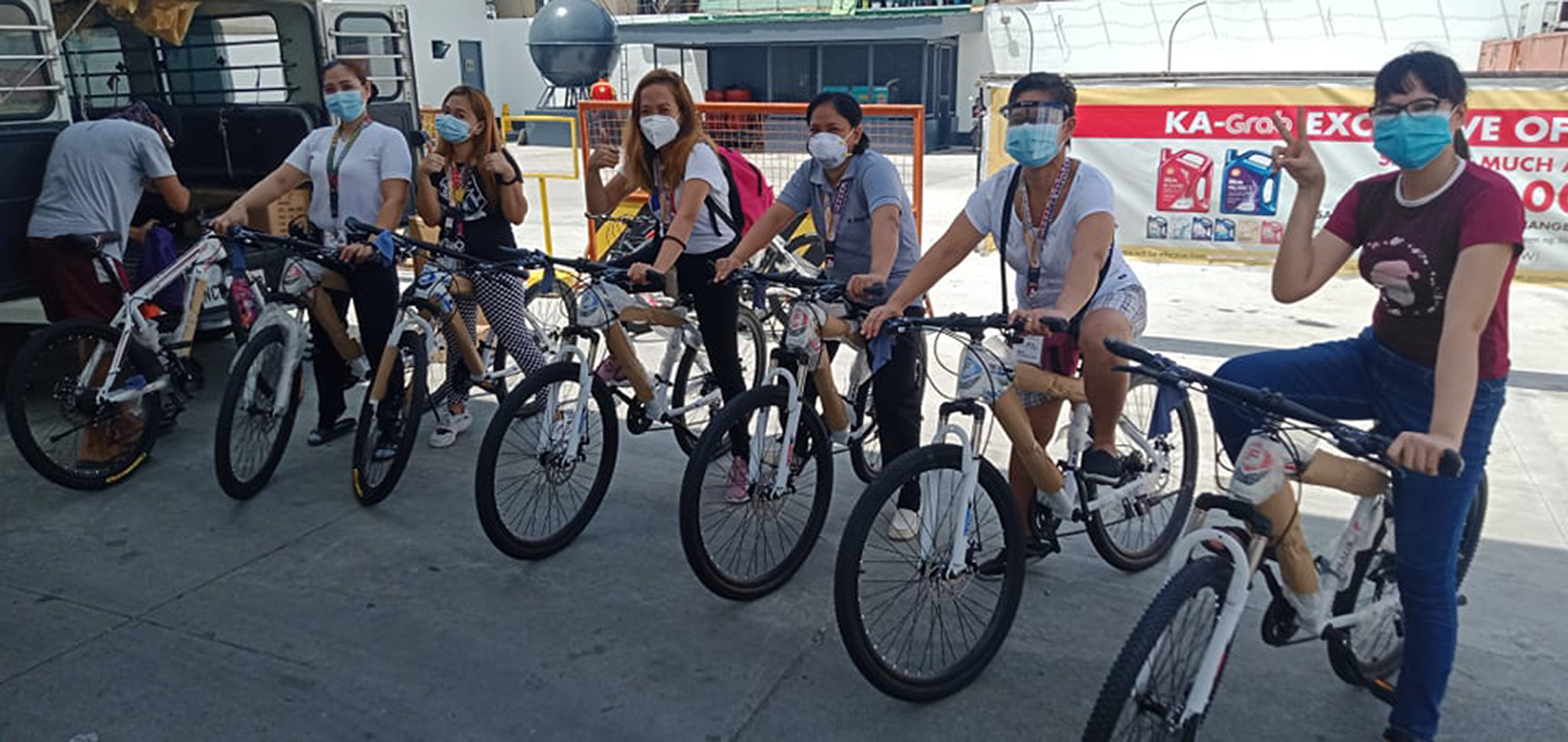
These frontliners — grocery staff, nurses, security guards, and the like — are a few of the 145 women who received bicycles through Raya Buensuceso’s fundraiser. (Photo: Raya Buensuceso FB page)
Jaramia Amarnani is no newbie at bike commuting. The executive assistant at an international organization has been biking to and from work for six years. So, when she heard about the women who started biking because there was no public transportation during the March 2020 lockdown, she was concerned for their safety.
“When you bike on the road, you’re all alone,” Amarnani says in Filipino in a post on another Facebook page. “I wanted them [newbie women cyclists] to feel like they have a community where they can share stories.”
She started the Pinay Bike Commuter Community, a private Facebook group, with fellow bike commuters. (Pinay is a colloquial term for “Filipina.”) The community has 3,600 members. It is a safe space where they can freely discuss the finer points of using menstrual cups, swap horror stories of harassment, or share their thoughts on how their bikes are more than a means of getting from A to B.
Pinays like Raya Buensuceso and Keisha Mayuga tapped the power of social media to raise funds and donate bikes to female frontliners. Entrepreneur Buensuceso’s birthday wish last year was to donate two bicycles to Filipina frontliners. She posted her simple wish on her Facebook account — and was soon deluged by messages from “everyday Filipinas desperate for better transport options.”
She posted: “How do you assess relative need when dealing with a grocery store clerk who walks for six hours each day between Cavite and Alabang; a single mom struggling to make ends meet and for whom a ₱60 (about US$1.24) tricycle ride is equivalent to one meal; and exhausted nurses on 12- to 16-hour shifts who leave their homes four hours early just to catch the sole shuttle that can take them to work?”
Buensuceso was surprised when the donations poured in. By the end of the project, she had raised ₱532,534 (about US$11,000) and donated 145 bicycles to female essential workers, including single moms, health workers, and security guards.
Mayuga is an urban planner and transport specialist. In 2020, she started Life Cycles PH, a volunteer-run program that paired institutions in need with generous bike donors to make sure that frontliners — including doctors and nurses — could get to work during the lockdown.
All in all, Mayuga and her group helped more than 50 institutions, raised ₱3.3 million (about US$68,200), and donated bikes to 1,057 essential workers. “Sixty-one percent of the recipients of Life Cycles are women,” she says.
By Dinna Louise C. Dayao










